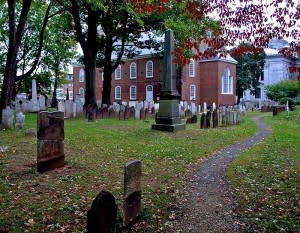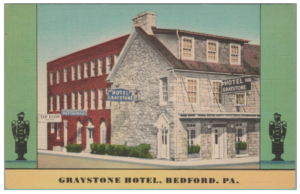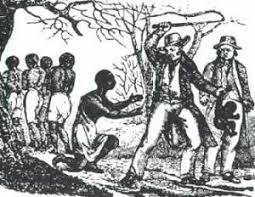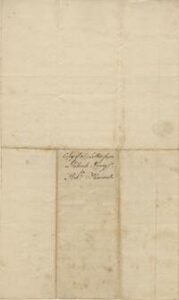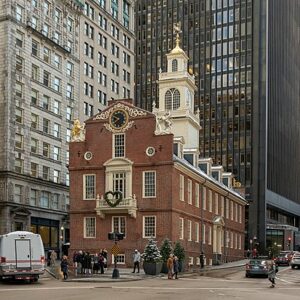Americanism Redux
January 26, 250 years ago today, in 1773
A beginning can be the start of a life together. Ask Mary.
Mary Ogden looks at the man standing next to her. There are a lot of Ogdens in the room waiting to hear what she says. “Do you, Mary, take this man…”
“Yes”, answers Mary Ogden and with that single word spoken in the company of family and friends and God she now is Mary Ogden Barber, bride of Francis Barber, the schoolmaster of Elizabeth, New Jersey. All those Ogdens—Mary has nine siblings—smile and grin. A new life together for Mary and Francis. How far ahead must a new couple look in anticipating a bigger crisis around them?
(Several weeks after the wedding, Mary dies)
A beginning can be the start of recognizing a problem. Ask John.
Long before anyone ever heard of a fictitious movie town in Pennsylvania called Bedford Falls there was a real Pennsylvania colonial town called Bedford.
Today 250 years ago Bedford has a justice of the peace, John Fraser. Fraser has seen a rise in crime that demands special attention. On the road from Bedford to Carlisle, also in the colony of Pennsylvania, thieves have been assaulting travelers. The bandits lay concealed in the thick woods that line the road and unleash a surprise attack on people riding by on horses or in carriages. It is nothing less than highway robbery. Fraser writes to Governor Richard Penn, Jr to start the search for a solution. Will a new trend fade if a bigger crisis appears?
(a Bedford tavern owned by John Fraser)
A beginning can be the struggle to grasp an entirely new way of life and living. Ask Felix.
Felix Holbrook is still waiting to hear what the politicians will say. Felix is part of a small but surprisingly growing number of enslaved black people in Massachusetts who now realize that a court of law and legal proceedings might just be the way to freedom. He’s written a petition, laced with emotion, to Governor Thomas Hutchinson: “We have no property. We have no wives. No Children. We have no City. No Country. But we have a Father in Heaven…” Each sentence stretches the chains, strains at the links, smells the air on the other side of the wall. Felix appeals to Hutchinson’s sense of morality, of spirituality, of ethics, of any scrap of right and wrong that can possibly reside in a human heart. Felix waits for the doors of the Massachusetts Town House to open wide and release the news of freedom. Will the righting of an injustice be helped or hurt by a bigger crisis?
(the current reality for Felix)
A beginning can be a confession of guilt in sustaining an old practice and the expression of hope in a coming redemption. Ask Patrick.
Patrick Henry and Robert Pleasants, two white Virginians, exchange letters. Pleasants, a Quaker in the spiritual, has sent Henry a book entitled “Against The Slave Trade.” Today, 250 years ago, Patrick Henry, passionate leader of the pro-colonial rights movement in Virginia and an enslaver of black people, replies with a note of thanks. More than that, though, is the voice in Henry’s head, heart, and soul. That voice tells him to share with Pleasants his own understanding that slavery is a horror and violation of Christianity, that slavery must be undone, that he is a perpetrator of this great crime against people. And so Henry writes thus in his letter to Pleasants: “I will not, I can not justify it,” he admits, “…I will so far pay my devoir (duty) to Virtue, as to own the excellence & rectitude of her Precepts, & to lament my want of conforming to them,” meaning—I know what virtue dictates about slavery and I have ignored those dictates; left unsaid and unwritten is whether virtue condemns as well as commands. But perhaps it’s not unmentioned after all, for a haunting vision ends the letter. “I know not where to stop, I could say many things on this Subject; a serious review of which gives a gloomy perspective to future times.” Patrick sees his hand doing the sin and prays to do what he does not know. How will a travesty find reform if a bigger crisis occurs?
(the exterior of Henry’s letter to Pleasants)
Everything begins, including the end, which marks another beginning. Mary, John, Felix, and Patrick stand at a beginning today, 250 years ago, and have a tomorrow as the next day, when begin becomes began and foregone becomes forget. And a crisis still taking shape and still finding form will mean…what exactly?
Also
At the same Massachusetts Town House from which news might one day emerge for Felix Holbrook, the assembled members of the Massachusetts General Court—the legislature of the colony—gathered to hear read aloud the formal legislative reply to a recent speech by Massachusetts Governor Thomas Hutchinson.
(Governor Thomas Hutchinson)
Hutchinson’s speech of three weeks ago had lamented spread of beliefs that the colony was unrepresented in the British Parliament and, as such, not bound to its laws and rulings, its regulations and procedures. Hutchison had attempted to dismantle these views via analysis, argument, logic, and examination.
Yesterday, the day before today 250 years ago, five members of the upper house of the legislature, the Council, replied to Hutchison’s speech. They politely rejected Hutchinson’s points and included this assertion: “If Supreme Authority includes unlimited Authority, the Subjects of it are emphatically Slaves: and equally so whether residing in the Colonies or Great-Britain.” They emphasized the long-standing practice of no taxation without representation, an argument first made in the seventeenth century and lately by, among others, Patrick Henry. They also invoked natural rights as the basis of all government.
Today, 250 years ago, nine members of the lower house or General Court of the legislature added their reply in the wake of Hutchinson’s speech and the Council’s message. The nine expressed themselves in more forceful language, less tempered of tone or softened with caution. The term “American” appeared in paragraph after paragraph. The spirit of difference, separation, and apartness circled and underlined words. They displayed a knifing audacity, jabbing Hutchinson with references to his own book he’d written about the history of Massachusetts. Their arguments explored British and colonial history in depth and detail. Massachusetts had enjoyed rights issued under a charter or special agreement with the British government. In the past seven or eight years—here they agreed with Hutchison—problems had emerged over representation, power, and consent. “These are great and profound Questions,” said the nine. “It is the Grief of this House, that by ill Policy of a late injudicious Administration, America has been driven into the Contemplation of them.”
A monumental debate was now under way. In the colony of Massachusetts one Governor, five of the Council, and nine of the General Court collided in powdered wigs and knee-high stockings. It was, rather naturally since it was January, a clear beginning of a new Stretch of the River, rounding a Bend. Beginnings are everywhere, from Mary to John to Felix to Patrick and now to the Governor single, the Council’s quintet, and the General Court’s decade minus one. Some beginnings will overarch and rise above, making shadow and shade for all beginnings underneath.
(Massachusetts Town House)
For You Now
Don’t let the fashions fool you. These aren’t re-enactors or staged scenes meant to distract for fifteen minutes or a half-hour. The candles in the windows are nothing less than small flames that explode if touched to the right substance. They will burn, scorch, destroy. When the fuel runs out, the blaze will die. After that, new shoots of green will be seen, the return of growth that was naturally in the ground. It will not be entirely created—it will be entirely rejuvenated and re-created. But it will be brighter, healthier, more vibrant. And the rest of the living will benefit.
You are seeing a change in the nature of the dispute between the pro-colonial rights and pro-imperial rights movements. You are witness to the drama of beginnings. You bring to your witness the noise of pronouncements in our recent years of supposed beginnings in politics, economics, social relations, and more. Some are true and some are untrue. But though you wear no powdered wig or brass-buckled shoe, you do know that both the true and untrue will slip beneath a singular beginning that arcs above all the rest.

Charred tree stumps and vibrant new growth, red and green foliage and plants in the forest after a fire.
Suggestion
Determine what you need to know in deciding which beginning is the one on the real rise.
(the rise of a new star)
